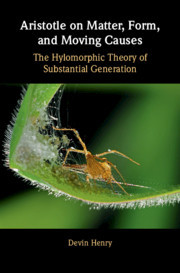Description
Aristotle on Matter, Form, and Moving Causes
The Hylomorphic Theory of Substantial Generation
Author: Henry Devin
Examines Aristotle's doctrine of hylomorphism and its importance for understanding the process by which substances come into being.
Language: English
Subject for Aristotle on Matter, Form, and Moving Causes:
Publication date: 12-2019
328 p. · 15.8x23.5 cm · Hardback
328 p. · 15.8x23.5 cm · Hardback
Description
/li>Contents
/li>Biography
/li>
This book examines an important area of Aristotle's philosophy: the generation of substances. While other changes presuppose the existence of a substance (Socrates grows taller), substantial generation results in something genuinely new that did not exist before (Socrates himself). The central argument of this book is that Aristotle defends a 'hylomorphic' model of substantial generation. In its most complete formulation, this model says that substantial generation involves three principles: (1) matter, which is the subject from which the change proceeds; (2) form, which is the end towards which the process advances; and (3) an efficient cause, which directs the process towards that form. By examining the development of this model across Aristotle's works, Devin Henry seeks to deepen our grasp on how the doctrine of hylomorphism - understood as a blueprint for thinking about the world - informs our understanding of the process by which new substances come into being.
Introduction; 1. Preliminary puzzles; 2. The hylomorphic model of substantial generation: Physics I; 3. Substantial versus non-substantial change: GC I 1-4; 4. The extended hylomorphic model: GC II 9; 5. Biological generation: part one; 6. Biological generation: part two; 7. The efficient cause of animal generation; 8. The architectonic model; 9. The cosmological significance of substantial generation.
Devin Henry is an Associate Professor in the Department of Philosophy at the University of Western Ontario. He is co-editor of Bridging the Gap between Aristotle's Science and Ethics (with Karen M. Nielsen, Cambridge, 2015) and has published many articles on ancient Greek philosophy.
© 2024 LAVOISIER S.A.S.




